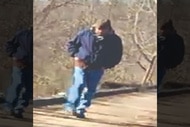Former Nevada Deputy Attorney General Accused Of Teen’s 1972 Hawaii Murder Fights Extradition
Nevada attorney Tudor Chirila Jr. is accused of stabbing 19-year-old Nancy Anderson 63 times in her Honolulu apartment more than 50 years ago, and is fighting his extradition to face charges in the case.

A former Nevada supreme court candidate with one-time ties to a legal bordello is personally fighting his extradition to another state, after he was arrested for a 1972 murder.
Tudor Chirila Jr., 77, was arrested in Reno on Sept. 13 for the murder of 19-year-old Nancy Anderson, who was stabbed 63 times in her Honolulu apartment more than half a century ago. On Wednesday, Chirila — once the deputy Attorney General in Nevada — appeared for his arraignment in a Reno courtroom and contested his extradition to Hawaii, claiming his constitutional rights had been violated, according to the Reno Gazette-Journal.
“Oh, your honor, I want to go to Hawaii. It’s so beautiful,” Chirila told Reno Justice of the Peace Scott Pearson. “The problem is, I don't think the arrest was constitutional.”
Chirila argued that his DNA, which was used to tie him to the cold case for which he was arrested, was taken under duress.
Appearing in the Reno Justice Court in a wheelchair, said the elderly defendant asserted that he provided his DNA — via a saliva sample — under threat of violence, claiming Reno authorities implied they could “beat the hell out of me if necessary,” Chirila told Pearson.
“I kept saying, ‘This is unconstitutional,’” Chirila continued.
The defendant also claimed that, when officers showed up at his apartment with a warrant for his DNA on Sept. 6, he was still recovering from recent eye surgery.
“I was scared to hell they were going to hit my eye,” said Chirila.
“You’re making me a witness against myself,” he said of the DNA collection. “Whether it’s Donald Trump saying ‘I refuse to answer a question,’ or me saying ‘I refuse to give any samples,’ it’s a constitutional right.” (While it is a constitutional right to refuse to provide a voluntary DNA sample, a warrant for its collection can legally be issued by the courts and subjects can be legally compelled to comply.)
Judge Pearson, however, ruled that any questions surrounding alleged constitutional violations would have to be raised in the Honolulu court that issued the warrant for the DNA collection, and that any allegations of unlawful police force could be taken up in civil court, according to the Gazette-Journal. He imposed a 10-day deadline for Chirila to formally file any motions related to his grievances.
The family of the victim in the case, Nancy Anderson, was in the courtroom for the hearing, having flown in from Florida, according to ABC Reno affiliate KOLO-TV.
Anderson — who’d moved to Honolulu from Bay City, Michigan and worked at a local McDonald’s — was found dead by her roommate, 18-year-old Jody Spooner, on Jan. 7, 1972.
Spooner returned to their shared apartment to find Anderson talking to two salesmen at around 2:30 p.m., and then took a nap. When she woke around 4:15 p.m., Anderson was dead on the floor of her blood-spattered bedroom. A fatal stab wound had pierced the young woman’s heart.
In 2020, Parabon NanoLabs assisted Honolulu police in creating a DNA profile from physical evidence found on bloodied towels found near Anderson’s body. Through a genetic genealogical line of inquiry, investigators found the suspect’s son in Newport Beach, California.
This led Reno authorities to Tudor Chirila’s apartment doorstep on Sept. 6 — with a warrant from Honolulu to collect his DNA.
Six days later, Honolulu police issued a warrant for Chirila’s arrest; by then, he was in a Reno hospital “regarding an attempted suicide,” according to the Gazette-Journal. Chirila was arrested without incident while still at the hospital.
Chirila had worked as a graduate assistant at the University of Hawaii in the 1970s and has been licensed to practice law in the state of Nevada since 1979. He served as a deputy attorney general and once ran for the state's supreme court.
He was also the president of a corporation affiliated with the Mustang Ranch, a well-known legal brothel just outside of Reno that had been tied to tax fraud and racketeering. According to KOLO, Chirila inappropriately helped late owner Joe Conforte — known for his alleged ties to organized crime and referred to as the “King of Prostitution” — regain control of the Mustang Ranch after the federal government seized the bordello and cooperated with prosecutors in the investigation, according to the Reno Gazette Journal.
Chirila also has previous arrests, including for a 1995 incident when he allegedly kidnapped and attempted to rape his girlfriend, according to KOLO. The girlfriend later dropped the charges.
Chirila is scheduled for another hearing on Oct. 3, according to CBS News. By then, he will be appointed a public defender, as ordered by the judge. He remains in a Washoe County jail without bail.



























